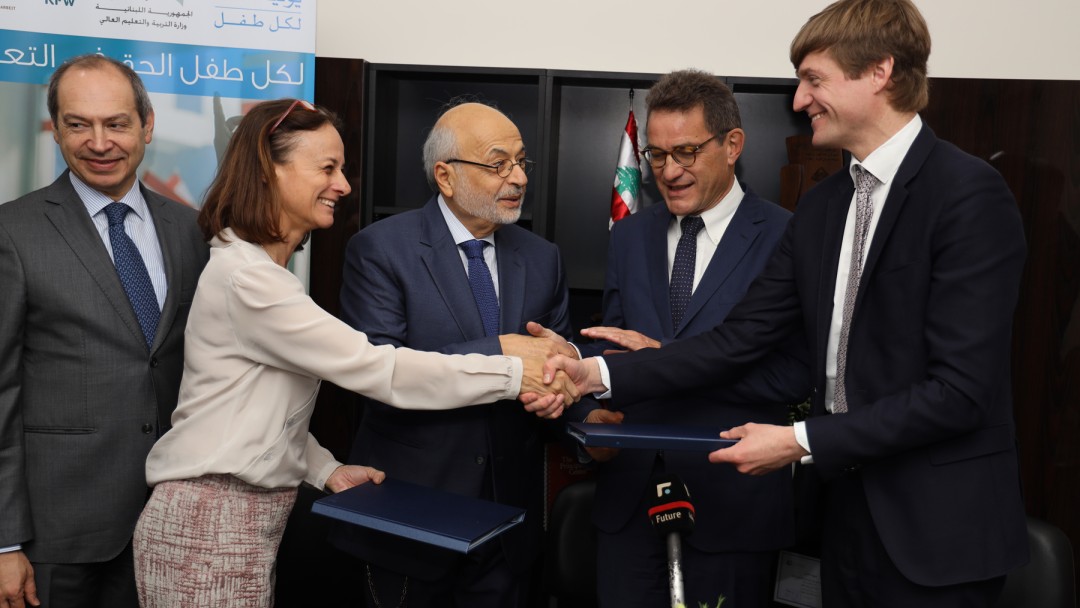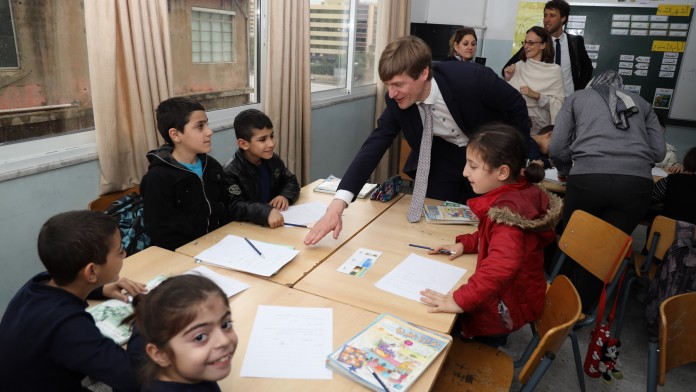News from 2019-02-07 / KfW Development Bank
Education for all – no “lost” generation

The German Federal Government is supporting the education programme “Reaching all Children with Education” (RACE) in Lebanon with another EUR 50 million. The financing is used for school fees – for children from Syrian refugee families and Lebanese families – as well as for the construction and renovation of school buildings.
At the end of 2018, KfW Development Bank and UNICEF signed a contract benefiting the Lebanese education programme “Reaching all Children with Education” (RACE). KfW is supporting the education programme in the current school year with EUR 50 million on behalf of the Federal Ministry for Economic Cooperation and Development (BMZ) and is using these funds to finance the school fees of some 123,000 needy Lebanese and – mainly – Syrian children from refugee families. KfW has been supporting the programme on behalf of the German government with a total of around EUR 200 million since 2014. The official kick-off for the continued support took place on 6 February as part of a school visit and ceremony at the Uruguay First Public School in Beirut's Dekwaneh district. In addition to Lebanese Education Minister Akram Chehayeb, the ceremony was attended by Dr Georg Birgelen, German Ambassador to Lebanon, Tanya Chapuisat, Director of the UNICEF Lebanon Country office, and Gunnar Wälzholz, KfW Director of Middle East Infrastructure and Reconstruction.
Eight years after the outbreak of the Syrian crisis, the challenges in the Lebanese education sector are still enormous. Almost half of the roughly one million Syrian refugees in Lebanon (as of October 2018) are children. Despite considerable
efforts by the Lebanese Ministry of Education and the international donor community, about half of them had no access to formal schooling in 2018 either. To cope with the high numbers of pupils, many public schools in the country have been offering lessons in two shifts – mornings and afternoons – for the past few years.
“However, in many cases, there are economic and socio-cultural reasons that prevent parents from refugee families in particular from sending their children to school,” says project manager Jonas Rathfelder from the KfW office in Beirut. Last year, three out of four refugee households in Lebanon fell below the national poverty line. Financial hardship forces many children to contribute to the family income and, for example, to work on farms instead of attending school. Another obstacle is a lack of foreign language skills: Lebanese schools teach maths and science in English or French. Furthermore, children in the first year are required to have basic knowledge of the alphabet and numbers. Many Syrian children simply do not have this preliminary knowledge. In addition, many children and young people from refugee households are struggling with psychological stress, posing an additional challenge for teachers, and often making it hard for the children to take part in lessons.

Ambassador Dr Georg Birgelen said: “Children are our future. I am impressed by the Lebanese government's commitment to providing all children with a good education. Germany will continue to support these efforts, not only through the RACE programme, but also by investing in school infrastructure.”
As part of Financial Cooperation in the education sector, KfW is supporting not only the RACE programme in Lebanon, but also promoting access to non-formal education. It will play an even greater role in improving school infrastructure in the future. Support is also given to projects in the area of vocational training. The current portfolio of Financial Cooperation with Lebanon comprises approximately EUR 392 million, of which EUR 118 million goes to education. In his speech, Education Minister Akram Chehayeb thanked the German Federal Government for its continued support and said: “I am happy that my first school visit as the new Minister for Education is together with the German Ambassador. And: in spite of dwindling international support, we have admitted all pupils – regardless of nationality – to all state schools.”

Share page
To share the content of this page with your network, click on one of the icons below.
Note on data protection: When you share content, your personal data is transferred to the selected network.
Data protection
Alternatively, you can also copy the short link: https://www.kfw-entwicklungsbank.de/s/enzBWrMC.B7tA
Copy link Link copied